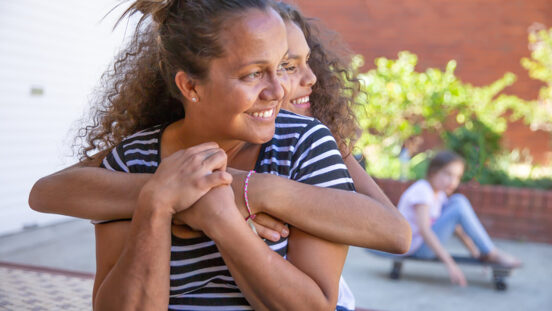4 ways parents can encourage empathy in their child, according to an expert
Remember, you are their biggest role model.
By Leith Sterling, Executive Director – Child and Family, The Benevolent Society
Helping your child to develop their empathy skills will likely have far-reaching benefits for their social and emotional growth. The ability to sense what someone is feeling, show compassion and understand different points of view is the bedrock of many positive behaviours. And it’s an ability most children are ready to start learning from an early age.
Studies suggest that children who learn about empathy when they are young go on to develop stronger social skills and adjust more easily to the school environment. They’re more likely to manage their responses to emotionally charged situations, such as disagreements, and find ways to cooperate and problem solve, rather than get distressed or angry.
Supporting your child with this development can take time and persistence, but the benefits are worth it.
Here are some ideas to help:
You do, they do
Like most things when it comes to parenting, your own actions and attitudes are key. You are your child’s biggest role model for their social and emotional growth. So, if you’re a consistently compassionate and comforting person, it’s likely your child will observe and mirror this behaviour.
For example, if you give your child a hug when they fall over and hurt themselves, they will tend do the same for a friend. Similarly, if you show you are interested in your child’s play, for example by commenting, “wow, I can see you’re trying really hard to build those blocks!”, your child will see that you are listening and interested in them, so they will be more likely to listen and be interested in others.

You are your child’s biggest role model for their social and emotional growth.
Recognise and label
Try encouraging your child to recognise and tell you about the emotion that they are feeling. If a child can recognise their own feelings, they can begin to empathise with other people’s feelings.
For example, when you notice your child is angry, use questions and prompts like, “I can see in your face that you are annoyed,” or, “it sounds like you felt angry, is that right?” This can give the child a language to communicate how they are feeling, in place of a negative behaviour like having a tantrum or acting out. It also shows your child that you are genuinely listening and interested in how they are feeling. Back to my previous point about modelling here.
Talk about it
Pointing out people’s emotions and talking about them can help your child become more attuned to what others might be thinking or feeling. This can be done in a variety of ways.
Praise them
Helping someone, sharing their toys, or doing small jobs around the house are just some of the many opportunities there are to praise your child for being empathetic. Complimenting and rewarding this kind of compassionate behaviour can help motivate them to repeat it.




